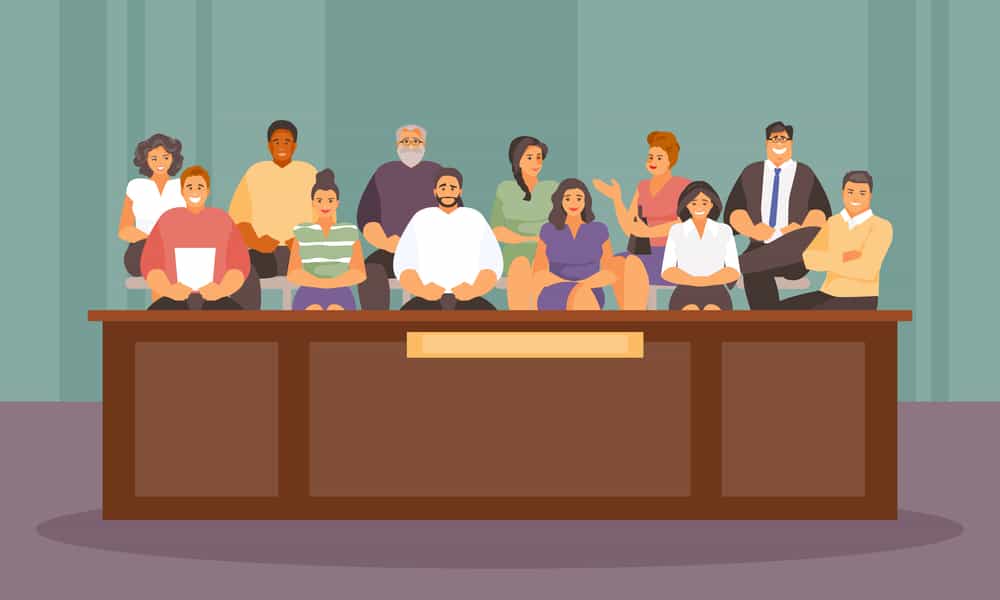Jury duty is a civic responsibility in the U.S., and every citizen is obliged to appear when summonsed for it. Moreover, the constitution guarantees an impartial jury trial in criminal or civil cases.
Anyone called for jury duty must appear before the court; otherwise, they are at risk of being held in contempt. Employees are not always reimbursed by employers when reporting for federal duty because it isn’t compulsory in the Fair Labor Standards Act (FLSA). Largely remuneration depends on which state the employee works in and whether they work for a federal, state, local or private entity. However, an employer cannot fire an employee for time taken off for jury duty.
When the government brings a case against the defendant in a criminal case, it must prove its guilt beyond a reasonable doubt, and the jury must present a unanimous decision from all jurors.
In civil cases, the judge instructs the jury how many votes are required from the 6 or 12 jurors to reach a verdict. Then, the presiding juror counts the votes and presents the judgment to the judge.
Jury Selection Process
The jury for each district court is usually randomly selected from the voters’ registry or those with a driver’s license. You fill in the questionnaire to ensure you qualify for jury duty. Anyone who qualifies them falls into the random selection process that ensures each trial has proper representation from proportionate community members regarding race, gender, national origin, political affiliation, and age.
When called for jury duty, you receive an official summons calling you for jury duty at a particular place, date, and time. When you present yourself to the court, you complete a questionnaire before participating in the process for the jury duty selection.
Different states have different laws about postponing jury duty, and if you cannot make it for some reason, you can ask for a postponement to perform this task at a more convenient time. It is best to telephone beforehand when you want to postpone and offer a future date when you can fulfill your duty. The court does not always grant postponements unless there is a valid excuse, so be prepared for this outcome.
Some reasons may get you permanently excused from jury duty altogether, but you need acceptable proof. Possible reasons for exemption include medical reasons, age, financial difficulties, caregivers, and some full-time students.
Voir Dire is the Next Step
If you make it into the group of qualified jurors, that does not mean that you will serve on a jury. When the court needs public members to serve as jury members, a group of qualified jurors is called to a courtroom for further questioning by lawyers from both sides in the trial. Potential jurors answer questions to help determine how suitable they are to serve on the jury of a particular trial. In the process known as voir dire, attorneys have the opportunity to exclude anyone unable to offer the defendant a fair trial because of conflict of interest or bias.
You must speak up if you know anyone involved in the case, if you already have information about the case, or if you have any strong prejudices about specific issues or people involved in the case. These are all reasons to get you excused by the judge. Sometimes the attorneys on the case also ask for the dismissal of certain jurors; they don’t have to give a reason.
Jury Duty and Time Off
Employers in every state must give employees time off work to perform jury duty. However, if jury duty would impact the employer’s business, then a request for postponement is usually considered by the court. In addition, depending on the state, the employer cannot always subtract the time spent on jury duty from the employee’s paycheck or leave time, whether vacation or sick leave.
Finally, any other adverse actions by the employer is illegal, including employment termination or harassment.
Conclusion
Narrowing the list of potential jurors includes a process of elimination until both the prosecution and defense are perfectly happy with their choice of jurors. Once chosen, the trial can move forward. When it approaches time for the jurors to decide, the judge presents the appropriate law applicable to the case, allowing the jury to determine the facts.
Despite being inconvenient, jury duty is essential to ensuring a fair trial and justice. As a jury member, you take an oath to consider only the evidence given in court, and your role is as important as the judge’s.



